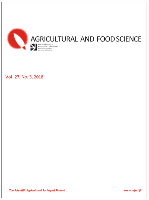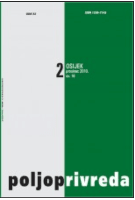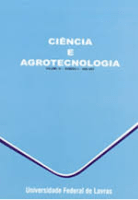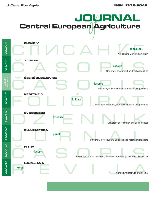
KSU Tarim ve Doga Dergisi-KSU Journal of Agriculture and Nature
Scope & Guideline
Empowering global collaboration in agriculture and environmental science.
Introduction
Aims and Scopes
- Agricultural Science and Crop Production:
Research on various agricultural practices, including crop yield optimization, soil management, and pest control strategies to enhance productivity in different climatic and ecological conditions. - Food Science and Nutrition:
Studies related to food quality, safety, and nutritional analysis, including the examination of food products, processing methods, and their impacts on health. - Horticulture and Plant Biology:
Investigation into plant growth, development, and breeding, as well as the exploration of plant properties for medicinal and nutritional purposes. - Environmental Science and Ecology:
Research focusing on ecological interactions, biodiversity conservation, and the impact of agricultural practices on natural ecosystems. - Animal Science and Veterinary Studies:
Research on animal husbandry practices, veterinary health, and the impact of nutrition on livestock performance. - Biotechnology and Genetic Studies:
Application of biotechnological methods in agriculture, including genetic modification, molecular biology, and studies on microbial interactions.
Trending and Emerging
- Sustainable Agriculture Practices:
There is an increasing emphasis on research related to sustainable farming techniques, including organic farming, agroecology, and conservation agriculture. - Climate Change Impact on Agriculture:
Research addressing the effects of climate change on agricultural productivity, crop resilience, and adaptive strategies has become increasingly prominent. - Functional Foods and Nutraceuticals:
Growing interest in the health benefits of functional foods, including studies on bioactive compounds and their effects on human health and nutrition. - Biotechnology Applications in Agriculture:
Research on the application of biotechnology for crop improvement, pest resistance, and sustainable agricultural solutions is on the rise. - Water Management and Irrigation Efficiency:
Emerging themes in water conservation techniques, efficient irrigation practices, and their impacts on crop yield and sustainability. - Plant-Based Solutions for Health and Nutrition:
A notable trend towards investigating the health benefits of plant extracts and their potential applications in food and pharmaceutical industries.
Declining or Waning
- Traditional Pest Control Methods:
There is a noticeable decline in research focused on conventional methods of pest control, as the emphasis shifts toward integrated pest management and biological control approaches. - Invasive Species Management:
Research on invasive species, while still relevant, seems to be less prominent compared to emerging themes focused on sustainable practices and native biodiversity. - Soil Chemistry and Fertility Studies:
Interest in detailed soil chemistry analyses appears to be diminishing, with a growing focus on holistic soil health and sustainable agricultural practices.
Similar Journals

AGRICULTURAL AND FOOD SCIENCE
Transforming agricultural practices through rigorous science.AGRICULTURAL AND FOOD SCIENCE is a prestigious journal published by the SCIENTIFIC AGRICULTURAL SOCIETY OF FINLAND, dedicated to advancing knowledge in the fields of agricultural and food sciences. With an ISSN of 1459-6067 and E-ISSN of 1795-1895, this open-access journal has been providing valuable insights and research findings since its inception in 2002. As of 2023, it holds a Q3 ranking in Food Science and is positioned at the 46th percentile within its Scopus category, ranking 210 out of 389 journals in Agricultural and Biological Sciences – Food Science. The journal features contributions from a global network of researchers, covering various topics including sustainable agricultural practices, food safety, and innovative food technologies. Based in Finland, the journal serves as an essential platform for scholars, professionals, and students who are committed to enhancing food security and agricultural productivity through rigorous scientific research. The convergence of interdisciplinary studies from 2004 to 2024 marks a critical evolution in the scope of agricultural and food research, making this journal a vital resource for anyone involved in these dynamic fields.

Poljoprivreda
Fostering a community of agricultural excellence and innovation.Poljoprivreda is a distinguished open-access journal dedicated to the field of agronomy and crop science, published by the FAC Agriculture Osijek in Croatia. Since its inception in 2000, the journal has been committed to disseminating high-quality research that informs both academic and practical advancements in agriculture. With an ISSN of 1330-7142 and an E-ISSN of 1848-8080, Poljoprivreda provides a vital platform for researchers, professionals, and students to engage with the latest findings and methodologies in agronomy, contributing significantly to the enhancement of agricultural practices in Croatia and beyond. Although currently ranked in the 22nd percentile within its category according to Scopus, the journal aspires to elevate its standing by welcoming innovative research that addresses contemporary challenges within the agricultural sciences. By fostering open access since 2000, Poljoprivreda ensures that its scholarly content is freely available, promoting wider dissemination and collaborative opportunities among researchers globally.

Agrarforschung Schweiz
Pioneering insights into the future of food and environmental stewardship.Agrarforschung Schweiz is a premier journal dedicated to advancing the fields of agronomy, animal science, food science, and environmental studies. Published by AGRARFORSCHUNG in Switzerland, this journal serves as a vital platform for the dissemination of research findings that address contemporary challenges in agriculture and food systems. With an emphasis on open access, researchers and practitioners are encouraged to share their work, fostering a collaborative environment for knowledge exchange. Although currently listed in Q4 of several agricultural categories, the journal is poised for growth and aims to enhance its impact within the academic community. It features a wide range of topics from innovative agricultural practices to sustainability and pollution management, catering to a diverse audience of researchers, students, and industry professionals. Given the rich agricultural heritage of Switzerland, Agrarforschung Schweiz aspires to contribute meaningfully to global discussions and advancements in agricultural sciences through rigorous peer-reviewed research and insights.

TROPICAL AGRICULTURE
Nurturing the growth of agronomic research in the tropics.Tropical Agriculture is a reputable journal dedicated to advancing knowledge and research in the fields of Agronomy and Development, with a particular emphasis on tropical farming practices and agricultural innovation. Published by the University of the West Indies, this journal serves as a crucial resource for researchers, professionals, and students engaged in the complexities of agriculture in the tropics. Established in 1979, it has witnessed significant contributions and continues to facilitate scholarly discussions through its quarterly publications. While the journal currently holds a Q4 ranking in both the Agronomy and Development categories, its commitment to fostering research excellence positions it as a pivotal platform for emerging studies and regional agricultural advancements. Although not an open-access publication, it provides critical insights and localized research that greatly benefit the agricultural community, particularly within the Caribbean context. Researchers and professionals in the field can rely on this journal for insightful content on tropical agricultural challenges and developments, enhancing knowledge dissemination and application across related disciplines.

AgroLife Scientific Journal
Exploring Frontiers in Agro-Scientific Research.AgroLife Scientific Journal, published by the University of Agronomic Sciences and Veterinary Medicine Bucharest, is a distinguished platform for disseminating research within the field of agricultural and biological sciences. Established as an Open Access journal since 2012, it aims to facilitate knowledge sharing and enhance accessibility to vital information in agriculture, veterinary medicine, and related disciplines. With an ISSN of 2285-5718 and E-ISSN of 2286-0126, the journal welcomes innovative research articles, review papers, and case studies that explore contemporary challenges and breakthroughs in the agro-scientific community. It is noteworthy that in the 2023 Category Quartiles, the journal is classified as Q4, reflecting its role in the broader academic landscape, though with significant growth potential as indicated by its Scopus Rank of #152 out of 193. Researchers, professionals, and students can leverage the journal's open access model to remain at the forefront of agricultural research while contributing to a collaborative scholarly conversation.

CIENCIA E AGROTECNOLOGIA
Advancing Agricultural Innovation for a Sustainable FutureCIENCIA E AGROTECNOLOGIA, published by UNIV FEDERAL LAVRAS-UFLA, is a vital open-access journal since 2005 that serves as an influential platform for disseminating research in the fields of Agronomy, Animal Science, Food Science, Soil Science, and Veterinary Science. With its ISSN 1413-7054 and E-ISSN 1981-1829, this journal is recognized for its contribution to science and technology advancements in agriculture, particularly in Brazil, fostering knowledge exchange among researchers, professionals, and students. Currently ranked in the Q2 quartile for Agronomy and Crop Science, Animal Science and Zoology, and in the Q3 quartile for Food Science and Soil Science, it demonstrates a solid international standing in the relevant Scopus indices. The journal's commitment to open access ensures that critical research findings are freely available, enabling a broader impact and encouraging collaborative advancements in agritech. As the journal looks towards its converged years from 2007 to 2024, it continues to uphold its objectives of promoting sustainable practices and innovation within the agricultural sciences.

Journal of Central European Agriculture
Exploring Agricultural Frontiers for a Sustainable FutureThe Journal of Central European Agriculture, with ISSN 1332-9049 and E-ISSN 1332-9049, is an esteemed platform published by UNIV ZAGREB, FAC AGRICULTURE that caters to the dynamic fields of agronomy, crop science, and animal science. Since its establishment in 2000, this Open Access journal has played a crucial role in disseminating critical research findings while fostering collaboration among academics, researchers, and professionals within the agricultural community. The journal, which is based in the heart of Croatia, spans a rich history of scholarship, with its content available for free to readers and contributors alike. As reflected in its current standings, the journal has achieved a Quartile 3 ranking in Agronomy and Crop Science and Quartile 4 in Animal Science and Zoology for the year 2023, indicating its growing influence within these disciplines. With Scopus ranks placing it in the 32nd percentile among its peers, the Journal of Central European Agriculture is committed to advancing agricultural sciences not only in Central Europe but globally as it prepares for its converged years from 2007 through 2024. This journal serves as a vital resource for innovative research, practical applications, and a deeper understanding of agricultural challenges and solutions.

International Journal of Agriculture and Natural Resources
Empowering Sustainable Agriculture Through Open AccessInternational Journal of Agriculture and Natural Resources is a premier academic journal published by the Pontificia Universidad Católica de Chile, Facultad de Agronomía e Ingeniería Forestal. With an ISSN of 2452-5731 and an e-ISSN of the same, this journal operates as an Open Access publication, allowing for the widespread dissemination of research findings pertinent to the fields of agriculture and natural resources. As of 2023, it holds a commendable Q2 ranking in Agricultural and Biological Sciences, indicating its significant contribution to the field. The journal's objective is to provide a platform for innovative research and in-depth analyses on emerging trends and challenges within agriculture, promoting sustainability and ecological balance. Covering a broad spectrum of topics, it aims to foster dialogue among researchers, professionals, and students, ultimately enhancing knowledge and fostering collaboration. With a current Scopus rank of #93 out of 221 in the general agricultural and biological sciences category, it occupies a vital role in advancing research and practices in agriculture and related disciplines.

Revista de la Facultad de Agronomia de la Universidad del Zulia
Cultivating Knowledge: Where Research Meets Real-World ImpactWelcome to the Revista de la Facultad de Agronomia de la Universidad del Zulia, a key publication in the fields of Agronomy, Animal Science, Food Science, and Plant Science. Published by the Facultad de Agronomía, Universidad del Zulia, this journal aims to foster academic dialogue and disseminate impactful research that advances knowledge and practice within these disciplines. Operating under the ISSN 0378-7818 and E-ISSN 2477-9407, this journal offers a platform for both emerging and established scholars to share their discoveries and innovations. Despite its challenges, as reflected in its Q4 ranking across multiple categories in 2023, it remains a vital resource for the Venezuelan scientific community and beyond. Readers will benefit from a diverse array of studies and discussions that address contemporary issues in agriculture and related fields, helping inform best practices and policy. Engage with cutting-edge research from Venezuela and contribute to the development of agronomic sciences in the region.

Engenharia Agricola
Pioneering research in agricultural engineering excellence.Engenharia Agricola, published by the SOC BRASIL ENGENHARIA AGRICOLA, is a crucial open-access journal that has been at the forefront of agricultural engineering research since its inception in 1981. With an E-ISSN of 1809-4430 and an ISSN of 0100-6916, this journal stands out in the field by providing a platform for disseminating innovative studies and advancements in agricultural practices and technologies. Based in Brazil, the journal emphasizes global perspectives in agricultural and biological sciences, currently positioned in the Q3 quartile of its category, as recognized in the 2023 Scopus Ranks, where it ranks 97 out of 193 publications. Researchers, professionals, and students can access a plethora of high-quality articles that contribute to sustainable agronomy, agricultural mechanics, and resource efficiency across various environments, with open access since 2004, ensuring that critical knowledge is readily available to all stakeholders in the field.